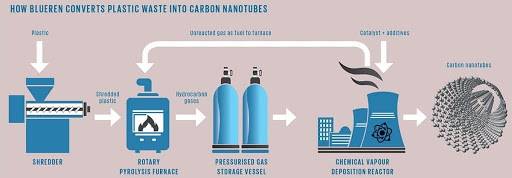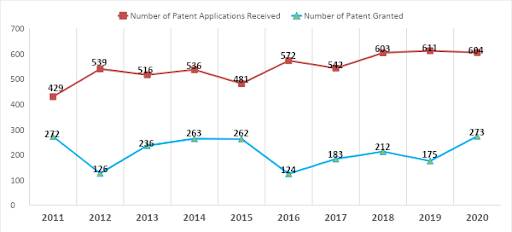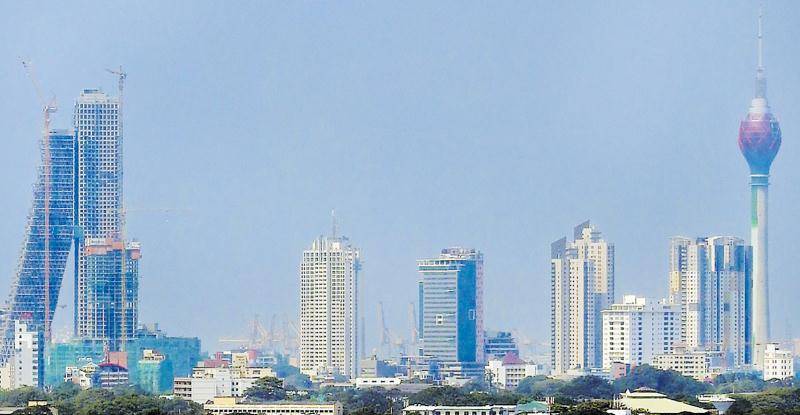By Sheron Hewawaduge
Innovation is an essential driver of economic progress. The 2030 agenda for Sustainable Development goes beyond economic growth and requires innovation for sustainability. Process innovation to decouple economic growth from environmental degradation is of a great importance to achieve sustainable development.
Any modification to the existing manufacturing process, which reduces the emission of greenhouse gases and use of non-renewable or toxic materials and waste, or increase the use of clean energy or energy efficiency, could be taken as sustainable process innovation. For example, Singapore’s BlueRen company has developed a manufacturing process that produces carbon nanotubes using discarded plastics. These nanotubes are being used to design Singapore’s skyscrapers and other buildings. This invention helps to reduce the plastic waste generation through recycling and reuse.
(Source: Singapore International Foundation [2016])
Sustainable Development Goal (SDG) 9.2 focuses on promoting inclusive and sustainable industrialisation by 2030. Empirical evidence strongly suggests that sustainable manufacturing has a positive impact on company performances. A research done by J.M Kneipp, C.M. Gomes, R.S Bichueti, K. Frizzo, and A.P. Perlin (1) has found that there are significantly positive associations between several variables related to sustainable innovation practices and company performance. Another study, done by Urhan Gunday, Gunduz Ulusoy, Kemal Kilic, Lutfihak Alpkan (2) has found that there is a positive effect of innovations on firm performance in manufacturing industries.
Looking into the national context, fostering innovation is essential to win economic and environmental challenges and also to strengthen the financial position of the country. However, according to the Global Innovation Index Ranking in 2020, Sri Lanka ranked at 101 out of 131 countries, showing that Sri Lanka has a long way to go to truly benefit from innovation-driven development.
The national policy framework of “Vistas of Prosperity and Splendour” has placed a special focus on innovations with the aim of promoting Sri Lanka as a global innovation hub. It outlines strategies to develop agriculture through advanced technological innovations such as providing financial allocations to enhance research facilities, providing assistance to develop innovative bio-pesticides and low-cost integrated pest management systems, establishing patent systems, etc. It also focuses on encouraging researchers, scientists, and producers in the rubber industry to undertake research in value addition and technological innovations.
According to the World Intellectual Property Organisation (WIPO), a patent is an exclusive right granted for an invention, which is a product or a process that provides a new way of doing something or offers a new technical solution to a problem. Therefore, the number of granted patents can be taken as a useful indicator to measure innovation performance of a country.

Fig. 1: Total number of patent applications and patent granted in Sri Lanka (2011-2020)x (Source: The National Intellectual Property Office of Sri Lanka)
According to Fig. 1, in Sri Lanka, despite the economic downturn due to the Covid-19 pandemic, the number of granted patents has increased in 2020 compared to previous years. Amidst the pandemic, this is a significant improvement, which may shed light on the business opportunities emerging in the post-Covid-19 context. The low-cost open-source ventilator and the semi-automated telepresence robot to provide treatment for Covid-19 patients are some of the pandemic-related inventions introduced in Sri Lanka.
Innovation plays a critical role in value-added industries in Sri Lanka, especially in export sector industries such as gem and jewellery, mineral sand, phosphate, fertiliser and graphite, etc. Value addition to the domestic graphite industry by producing graphene from graphite is a good example. The Sri Lanka Institute of Nanotechnology has developed a method in producing graphene, which is used in many industries such as automotive, battery, and electronic. Hence, innovation is significant to improve export competitiveness and increase turnover.
 Renewable energy is another potential sector which requires technological innovation. SDG 7.2 aims to increase the share of renewable energy in the total energy mix. The cost of generating electricity from renewable energy sources is higher than the non-renewable sources such as coal. According to the Statistical Digest of the Ceylon Electricity Board (3), the share of total electricity generation using coal is 34%, while the share of renewable sources is only 5% in 2019. Therefore, technological innovations to increase energy generation from renewable sources and to minimise the cost are important to increase the share of renewable energy in the total energy mix.
Renewable energy is another potential sector which requires technological innovation. SDG 7.2 aims to increase the share of renewable energy in the total energy mix. The cost of generating electricity from renewable energy sources is higher than the non-renewable sources such as coal. According to the Statistical Digest of the Ceylon Electricity Board (3), the share of total electricity generation using coal is 34%, while the share of renewable sources is only 5% in 2019. Therefore, technological innovations to increase energy generation from renewable sources and to minimise the cost are important to increase the share of renewable energy in the total energy mix.
It is imperative to adopt new strategies to boost innovations and promote Sri Lanka to be a part of the global innovation network. Through analysing the efforts of national innovation systems in Brazil, Russia, China, and South Africa (BRICS), Jose E. Cassiolato, Graziela Zucoloto, Dinesh Abrol, and Xielin Liu (4) have found that the BRICS governments have common strategies to attract foreign direct investment (FDIs), particularly from multinationals, to modernise manufacturing and increase productivity. Therefore, Sri Lanka should explore to attract investment, including FDIs, to modernise the manufacturing sector in a sustainable way.
In addition to investment, initiatives to harness the maximum contribution from potential entrepreneurial firms, research institutes, and universities are also important. Offering tax incentives for research and development is crucially important to promote innovations in Sri Lanka. Access to finance, tax concessions, and proper mechanisms to commercialise innovations will empower potential entrepreneurs. Boosting research and development by incentives, access to finance, increasing public awareness, enhancing entrepreneurs’ interaction with the research institutes, and knowledge-sharing with global innovation networks will foster innovations to accelerate the economic progress and sustainable development in Sri Lanka.
(The writer is the Assistant Director of the Sustainable Development Council of Sri Lanka)
(The Morning)

